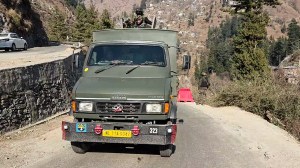Beyond semantics
Diplomatic silence is not a virtue that Pakistan8217;s president, Pervez Musharraf, values. His latest remarks on a 8220;trilateral8221; ...

Diplomatic silence is not a virtue that Pakistan8217;s president, Pervez Musharraf, values. His latest remarks on a 8220;trilateral8221; dialogue between India, Pakistan and Kashmiri representatives and his commendation of 8220;international guarantees8221; for a final settlement of the Jammu and Kashmir question might set off alarm bells in New Delhi. For two generations of Indians brought up on a diet of 8220;bilateralism8221;, all references to tripartite talks, involving the people of Jammu and Kashmir, and the intervention of the international community in the peace process, are unacceptable. For diplomatic purists in New Delhi, posturing has been everything in Indo-Pak relations. But there is little reason for the India to respond in a kneejerk fashion.
For Pakistan, India8217;s decision to let the Hurriyat leaders travel across the Line of Control is a huge gesture. Musharraf needs the Hurriyat to legitimise his reversal of course on Kashmir where he has shifted the emphasis from 8220;self-determination8221; to 8220;self-governance8221;. India should cash in rather than violently object to Musharraf8217;s characterisation of the process as trilateral. For India, the Hurriyat is a nuisance and by no means the 8220;legitimate representative8221; of the people of J038;K. It is willing to engage it as one of the political tendencies in J038;K. Meanwhile, India has already got Musharraf to concede 8212; during his visit to Delhi last month 8212; that there are other forces in J038;K that must be contended with. For India there is no room at the table for three in the Indo-Pak dialogue. While the Indo-Pak dialogue will continue to remain bilateral, common sense suggests that an enduring solution will have to be backed by the people of Jammu and Kashmir.
Pragmatism also tells us that international guarantees for an Indo-Pak settlement on Kashmir would indeed be useful. Pakistan, which sees itself as a weaker party, will always need some reassurance that India will abide by the arrangement. India, too, with its bitter memory of Pakistan walking away from the Simla Agreement of 1972, might find it worthwhile to have an international endorsement of the settlement on J038;K. International endorsement, however, does not mean an 8220;internationalisation8221; of the Kashmir question. For the negotiations will remain strictly bilateral. India and Pakistan have dribbled the peace process too far down the road to now abandon an exciting game. Having said this, however, occasional silence from Musharraf would certainly help insulate the current engagement from the sterile semantic wars of the past.
- 01
- 02
- 03
- 04
- 05






























